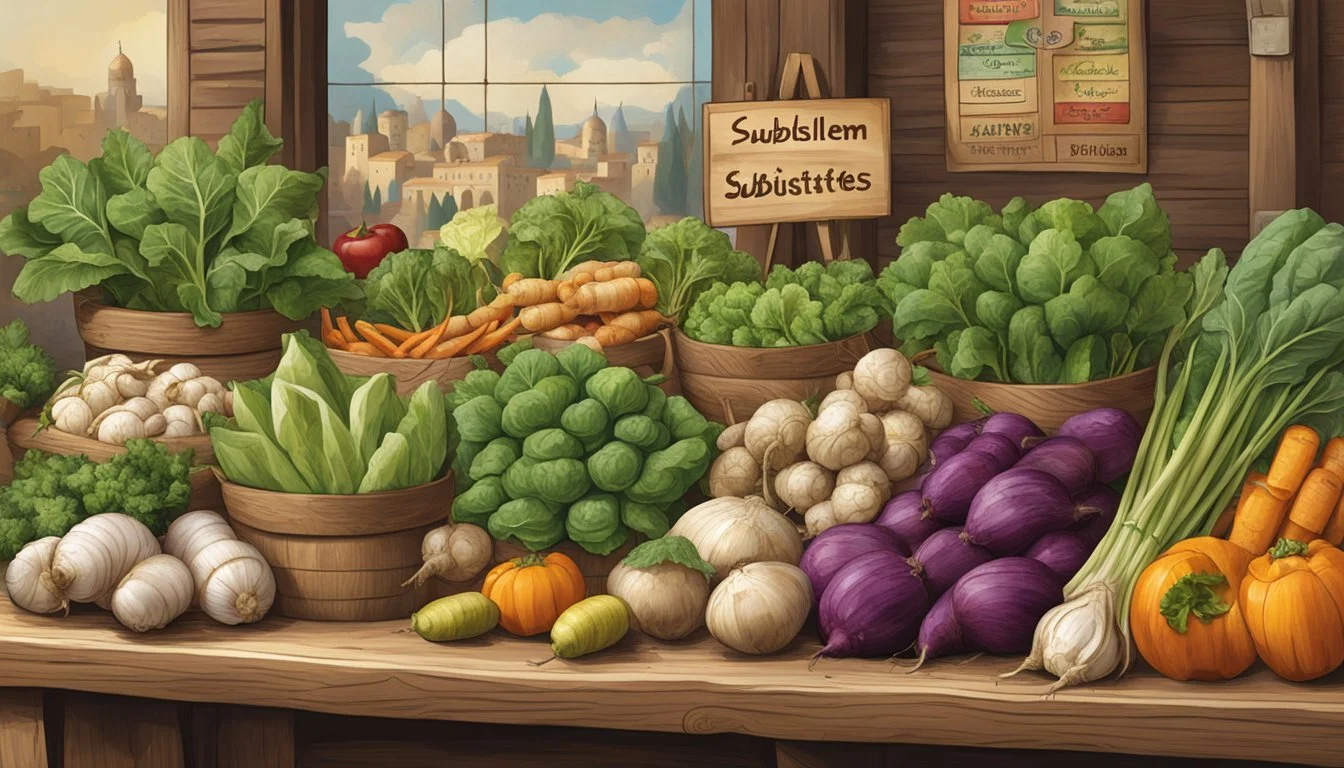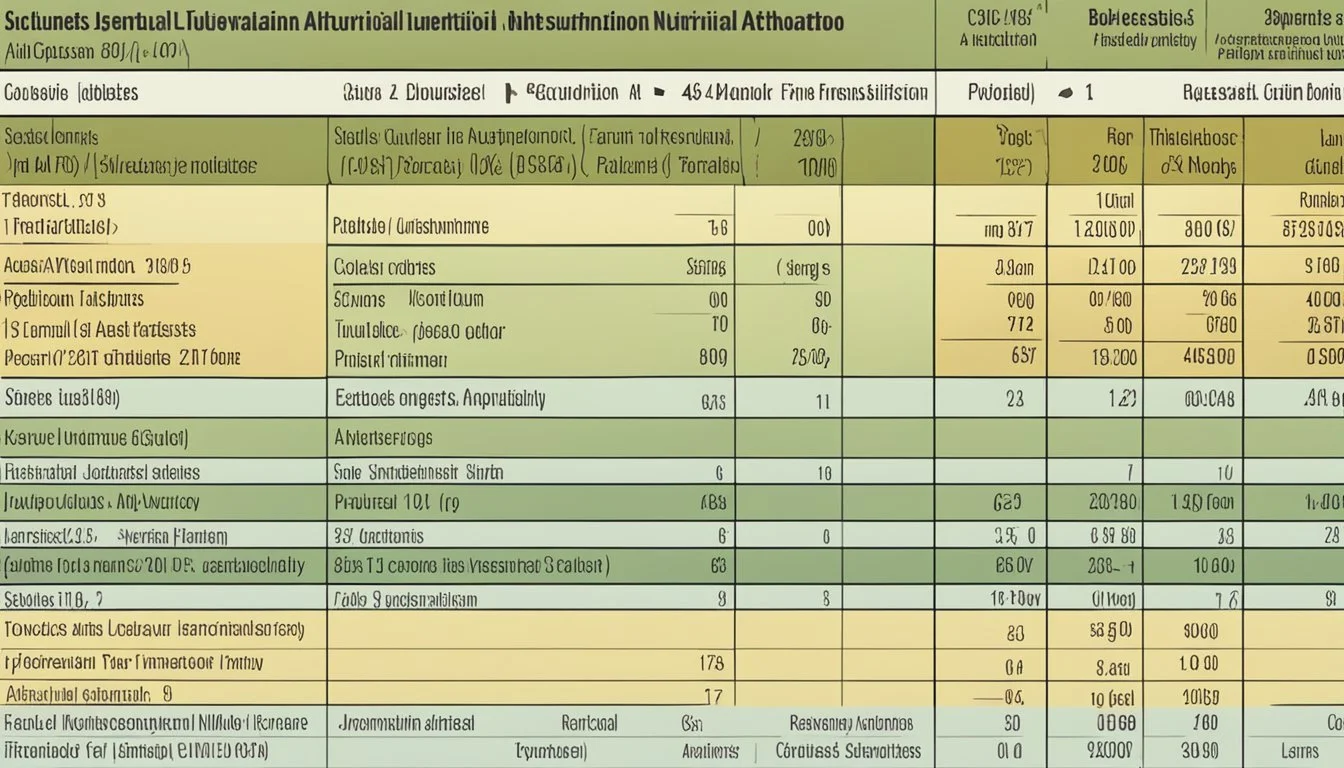Jerusalem Artichoke Substitutes
Best Alternatives for Cooking
Jerusalem artichokes, also known as sunchokes, are a versatile ingredient cherished for their nutty, slightly sweet flavor and crunchy texture. When Jerusalem artichokes are not available, there are several excellent substitutes that can seamlessly fit into your recipes, offering similar taste and texture profiles. These alternatives are not only readily available but also can add a delightful twist to your culinary creations.
Jicama is an exceptional substitute for Jerusalem artichokes with its sweet flavor and crunchy texture. Often referred to as Mexican turnips or Mexican yam beans, jicama can mimic the crunch and mild sweetness of Jerusalem artichokes in salads and raw dishes. Potatoes can also be an outstanding alternative, especially in cooked dishes, where they can replicate the starchiness and mild flavor when baked or roasted.
For those looking to replicate the buttery texture of cooked Jerusalem artichokes, bamboo shoots and the heart of the palm are excellent choices. Both options can provide the desired consistency in stir-fries and soups, adding their slightly unique flavors while maintaining the overall integrity of your dish.
Understanding Jerusalem Artichokes
Jerusalem artichokes, also known as sunchokes, offer a unique combination of nutritional benefits and culinary versatility. Native Americans originally cultivated these tubers, which later became popular in Europe.
Nutritional Profile
Jerusalem artichokes are rich in several essential nutrients. They are an excellent source of fiber, aiding in digestion and promoting a healthy gut. They boast high levels of potassium, which helps regulate blood pressure and maintains fluid balance. Additionally, they contain calcium, vital for bone health and muscle function.
These tubers are also rich in vitamin C, which supports the immune system and skin health. Iron is another key component, necessary for oxygen transport in the blood. They also offer a range of B vitamins, including thiamine, riboflavin, and niacin, which are crucial for energy production. Magnesium and phosphorus are also present, along with various antioxidants that protect cells from damage.
Culinary Uses
Jerusalem artichokes are highly versatile in the kitchen. Their unique texture and flavor make them suitable for a variety of dishes. They can be sliced thin and added to salads for a crunchy addition or cooked into soups and stews for a hearty, earthy note.
Cooking methods include roasting, which brings out their natural sweetness, and steaming or grilling for a softer, yet slightly crispy texture. They can be pureed into creamy dishes or sliced and sautéed for a savory side dish. Their adaptability in both raw and cooked forms makes them a favorite among chefs and home cooks alike.
Taste and Texture
The taste of Jerusalem artichokes is mild yet distinctive. They have a slightly nutty flavor reminiscent of a mix between artichoke hearts and potatoes. The texture is noteworthy for its crunchiness when raw, making them an excellent addition to salads for a fresh bite. When cooked, their texture becomes more tender, often described as buttery and smooth.
The duality in their crunchy and creamy characteristics depending on preparation methods provides a range of culinary possibilities. This versatility in flavor and texture makes them compatible with various ingredients, enhancing both simple and complex dishes.
Choosing Substitutes for Jerusalem Artichokes
When seeking substitutes for Jerusalem artichokes in recipes, consider alternatives that match similar textures, flavor profiles, and nutritional benefits. Each substitute offers unique qualities that can enhance your dishes effectively.
Similar Texture Alternatives
Jerusalem artichokes have a crunchy texture, whether raw or cooked. Jicama is a standout replacement due to its crisp and slightly sweet nature, making it ideal in salads and slaws. Water chestnuts also offer a crunchy bite, particularly useful in stir-fries and Asian-inspired dishes. For cooked applications, kohlrabi provides a similar firm texture and can be roasted or sautéed. Bamboo shoots are another option, adding a familiar crunch to soups and stews. These alternatives maintain the desired textural element in your recipes.
Flavor Matches
For those looking to replicate the nutty, slightly sweet flavor of Jerusalem artichokes, certain vegetables are particularly effective. Parsnips offer a comparable sweetness with an earthy undertone, suitable for purees and roasted dishes. Salsify shares a similar sweet and mild flavor, making it a versatile substitute in soups and gratins. Chayote provides a gentle, slightly sweet taste that blends well in salads and sautés. Heart of palm gives a unique flavor that can mimic the tender, nuanced taste of artichokes in more refined recipes. Each substitute enhances your dish's taste without overwhelming it.
Nutritional Equivalents
A crucial aspect of choosing substitutes is maintaining the nutritional benefits of Jerusalem artichokes, rich in fiber, vitamin C, and essential minerals. Sweet potatoes are a robust alternative, high in fiber, vitamins, and antioxidants. Cauliflower and broccoli stems from the cabbage family are rich in vitamins and minerals, providing similar health benefits in a variety of dishes. Celery offers a low-calorie option with significant water content and fiber, suitable for raw and cooked recipes alike. Turnips provide an excellent balance of fiber and vitamins, making them a practical substitute for maintaining nutritional value.
By thoughtfully selecting substitutes based on texture, flavor, and nutritional content, you can effectively replace Jerusalem artichokes in any recipe, ensuring a delicious and healthful outcome.
Cooking with Substitutes
When substituting Jerusalem artichokes, it's important to consider the preparation method, adaptations to recipes, and how these substitutes pair with other ingredients to ensure the best results.
Methods for Preparation
Different substitutes require varied cooking methods to match the texture and taste of Jerusalem artichokes. Jicama, for example, is best used raw or lightly cooked due to its crunchy texture. Brussels sprouts are excellent when roasted or sautéed, offering a slightly nutty flavor. Chayote can be boiled, fried, or grilled, providing a mild taste and tender texture when cooked. It's crucial to match the substitute's cooking method to how Jerusalem artichokes would traditionally be prepared to maintain the integrity of the dish.
Recipe Adaptation Considerations
Adjusting recipes to incorporate substitutes for Jerusalem artichokes often requires some minor tweaks. If a recipe calls for pureed Jerusalem artichokes, consider using mashed potatoes or parsnips. These provide a similar creamy texture. Jicama and chayote work well in fresh salads where a crisp texture is desired. Sautéing or roasting substitutes like Brussels sprouts or heart of palm can replicate the desired earthy flavor suitable for side dishes or as pizza toppings. Be mindful of the substitute's flavor and texture profile to ensure the recipe adapts well.
Pairing with Other Ingredients
Substitutes for Jerusalem artichokes can be complemented with various ingredients to enhance their flavors. Olive oil or butter can be used for roasting, adding richness. Melted cheese pairs well with substitutes like Brussels sprouts and asparagus when used in casseroles or as pizza toppings. Lemon juice and herbs like thyme or rosemary can brighten dishes containing chayote or jicama. Incorporating these substitutes into salads, pasta dishes, and appetizers should align with the flavor profile of the original ingredient, ensuring a delightful taste experience.
Specialty Substitutes
Specialized substitutes for Jerusalem artichokes offer unique flavors and textures, enhancing various dishes ranging from salads to stews. They also provide diverse nutritional benefits suitable for different dietary needs.
Aromatic Comparisons
Jerusalem artichokes have a nutty taste with a hint of sweetness. Ginger can offer a complementary aromatic kick, giving a spicy undertone while maintaining a root vegetable's texture. Sunflower roots, less common but similar, provide a mild flavor and crunch. They carry essential nutrients like fiber and potassium, essential for a balanced diet. Hearts of palm can also mimic the texture, especially in cold dishes. They add a slightly tangy note but keep the dish light and refreshing.
For Specific Dishes
In stews and soups, sweet potatoes and yams are stellar substitutes. Their starchy nature thickens broths, offering a similar earthy sweetness. For salads, green beans and napa cabbage provide a crunchy texture without overpowering other ingredients. Using artichoke hearts in dips replicates the creamy texture of Jerusalem artichokes in recipes like artichoke-thistle dip. Another option is the heart of the palm, which works well in cold salads and antipasti, delivering a tender yet firm texture.
Health-Conscious Alternatives
Low-calorie substitutes are critical for those mindful of their nutrient intake. Bamboo shoots stand out as a low-calorie option, with a crisp texture and mild taste ideal for various dishes. Brussel sprouts offer a nutrient-rich alternative, perfect for those looking to boost their intake of vitamins C and K. For Mediterranean diets aiming for high fiber, green beans and napa cabbage are excellent. They provide crunch and vital nutrients without the extra calories, making them ideal for a health-conscious approach.
Incorporating these specialty substitutes can elevate your culinary creations, ensuring each dish remains flavorful and nutritionally balanced.
Nutritional Information for Common Substitutes
Common substitutes for Jerusalem artichokes, such as jicama, chayote squash, and Brussels sprouts, are rich in essential nutrients. These alternatives offer various vitamins, minerals, and fiber content, making them valuable in a balanced diet.
Vitamins and Minerals
Substitutes like jicama and chayote squash are excellent sources of vitamins and minerals. Jicama is high in Vitamin C, providing about 24 mg per 100 grams. It also contains small amounts of calcium and iron. Chayote squash is rich in folate, with about 93 mcg per serving, and also offers significant levels of Vitamin K and potassium. Brussels sprouts are notable for their high Vitamin K content, providing roughly 177 mcg per 100 grams, as well as beneficial amounts of Vitamin C and folate. These nutrients contribute to various bodily functions, including immune support and bone health.
Dietary Fiber Content
Dietary fiber is crucial for digestive health. Substitutes like jicama and Brussels sprouts are excellent sources of fiber. Jicama offers around 4.9 grams of fiber per 100 grams, making it ideal for salads and light dishes. Brussels sprouts contain roughly 3.8 grams of fiber per 100 grams, suitable for both fresh and cooked recipes. Chayote squash has a lower fiber content at about 1.7 grams per 100 grams but still contributes to a healthy diet. These fiber-rich alternatives aid in digestion and help maintain stable blood sugar levels.
Energy and Caloric Comparisons
Caloric content varies among these substitutes. Jicama is low in calories, with approximately 38 calories per 100 grams, making it a light option for snacks and salads. Brussels sprouts provide about 43 calories per 100 grams and are versatile in dishes like soups and stews. Chayote squash offers around 19 calories per 100 grams, which is extremely low and excellent for weight management diets. Comparing these alternatives provides a range of options depending on dietary needs and energy requirements.




